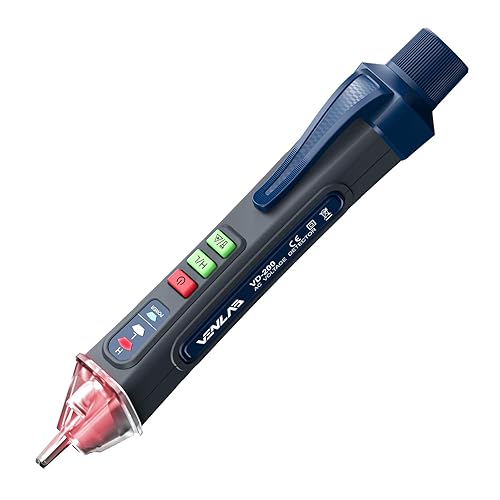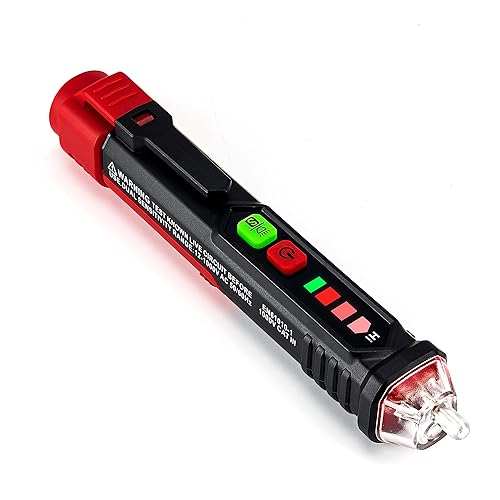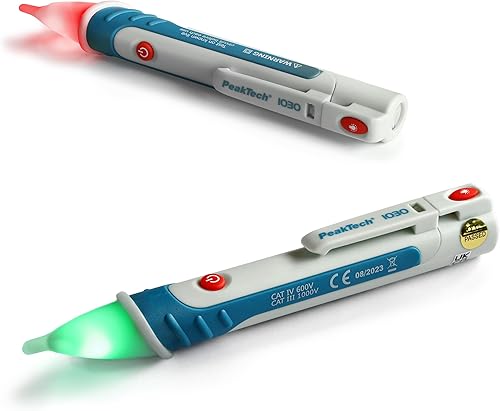How to Choose a Non-Contact Voltage Tester in 2025? Guide and Comparison
In the field of electricity and safety, non-contact voltage testers play a vital role. These tools allow you to quickly and effectively verify the presence of electrical voltage without the risk of shock. Whether you're a seasoned professional or a hobbyist, this device is essential for ensuring your safety during electrical work.
See also: the best battery testers
Our TOP 3
Venlab

Pros
- Extended functionality and usable in dark environments
- Compact and easy to use
- Effectively identifies phase and neutral
Cons
- Does not always detect 24V
- Lacks audio signal in some cases
Specs
KAIWEETS

Pros
- Adjustable sensitivity for increased accuracy
- LED indicator for easy detection
- Flashlight function and automatic shut-off
Cons
- Neutral detection sometimes imprecise
- Requires meticulous sensitivity adjustment
Specs
Peak Tech P 1030

Pros
- Ease of use and compact
- Reliable light and sound signal
- Good detection of low currents
Cons
- Not suitable for ELV (extra low voltage)
Specs
Choosing Criteria
Detection Sensitivity
Sensitivity is a crucial criterion for selecting a non-contact voltage tester. It determines the voltage range that the device can effectively detect. Choose a model offering a sufficiently wide detection range, typically from 50V to 1000V, to meet various residential and industrial electrical needs.
Visual and Audio Signaling
An effective detector must emit clear visual and audio signals. High-luminosity LEDs and loud beeps alert you to the presence of voltage. Some advanced models are equipped with LCD screens for precise visual reading, especially in noisy or dimly lit environments.
Rugged Environment Protection
Voltage detectors must be robust to withstand harsh environments. Look for models with an IP (Ingress Protection) rating against dust and water, ensuring increased durability in outdoor or industrial settings.
Additional Features
Some detectors offer additional features such as live wire detection through walls or an integrated flashlight to work in dark areas. These additions enhance the versatility and utility of the detector.
Common Errors
Use in Inappropriate Environments
A common mistake is using the detector in unsuitable environments, such as wet areas, without considering its IP protection rating. This can damage the device and compromise measurement reliability.
Misinterpretation of Signals
Some users, especially beginners, may misinterpret signals. It's crucial to thoroughly understand the user manual to correctly interpret the visual and audio indicators.
Comparison of our 3 favorite products
Venlab- Sensitive modes with integrated audio and visual signals

The Venlab non-contact voltage tester combines ease of use and versatility with its sensitive and normal modes. It provides clear visual and auditory detection with its red/yellow LEDs accompanied by an audio signal, perfect for dark environments thanks to its flashlight. Although slightly less reliable on 24V, it proves to be an effective tool for regular voltage testing and clear phase identification.
Pros
- Easy to use even in dark environments
- Ideal for phase/neutral detection with reliable LED display
- Compact and handy with a laser pointer
Cons
- Does not always accurately detect 24V
- No audio beep for all detected voltages
KAIWEETS- Adjustable sensitivity for precise detection

The KAIWEETS is a non-contact voltage tester that excels with its adjustable sensitivity, adapting to various needs of residential, commercial, and industrial environments. With its clear LED indicator, flashlight for dark environments, and automatic shut-off, this tester is an essential tool for any electrician seeking precise non-contact detection. However, accuracy in detecting neutral can sometimes be questioned.
Pros
- Adjustable sensitivity for varied use
- Good value for money and lifetime support
- Convenient and safe with multiple features
Cons
- Variable accuracy on neutral detection
Peak Tech P 1030- Loud audio signal with clear LED suitable for low currents

Lightweight and practical, the Peak Tech P 1030 stands out with a notable audio signal and clear LED, providing excellent visibility even under strong lighting. Reliable for fast diagnostics and verifying voltages from 50V to 1000V, this tool is a great ally for accurately detecting light electrical currents. It's the ideal model for a user looking for a compact tool that easily fits in a pocket.
Pros
- Compact, very distinct audio and visual signal
- Reliable for rapid detection even on low currents
- Convenient with pocket clip and light weight
Cons
- Not effective for extra low voltage
Practical Tips
Perform Verification Tests
Before and after each use, test the detector on a known voltage source to ensure it works correctly. This reduces the risk of false readings and electrical accidents.
Choose a Model with Replaceable Batteries
Opt for a detector with easily replaceable batteries. This ensures you always have an operational tool, especially with frequent use.
Consider User Reviews and Feedback
Check reviews and feedback from other users to assess the reliability and effectiveness of the models you are interested in. This will give you insights into potential issues or product durability.
FAQ
See also: